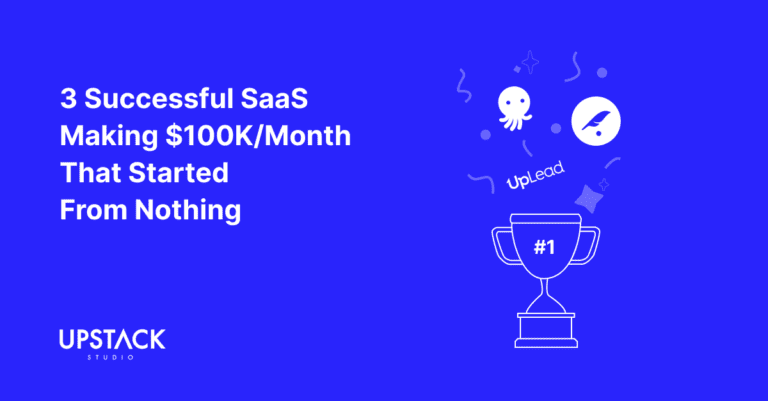Non Tech Founders Play Life on ‘Hard Mode’
So you don’t come from a technical background and want to start a tech business?
Dear reader, be warned – you’ve chosen to do business on hard mode.

Don’t worry, though, Upstack Studio has your back, and in this post, we’ll:
- Make you aware of the eight challenges you’ll face
- Show you the right way to deal with them, and
- Show you the wrong way to deal with them
We’re doing ourselves a favor here – Upstack Studio works with a lot of non-technical business owners.
The better they work with developers, the less we feel like giving out warm, fuzzy throat hugs.

Our hands are kind of tired to be honest, so let’s go through the list of eight non tech founder challenges one by one.
8 Non Tech Founder Challenges
1. Understanding Technical Concepts
This happens to all new non tech founders.
They’re at a meeting with developers and everyone’s throwing around terms like ‘pull requests’, ‘backend architecture’, and a few words that sound like Harry Potter spells.
On the inside, their brain has shut down.
2. Technical Decision-Making
React or Angular?
Custom solutions or third-party services?
Traditional server or AWS?
Making technical decisions as a non tech founder can feel like driving with a blindfold and needing to decide whether to turn left or right.
3. Hiring a Technical Team
The project needs a developer.
Or two developers?
Or three?
Oh wait, just one developer.
So they open up a resume and it’s 90% jargon, 10% acronyms, and they are 100% lost.
4. Managing a Technical Team
Say a founder hires technically competent developers.
And now the founder, who is no master of code, wants to be the master of technical decisions.
They don’t ask their developers for any input.
Never mind testing requirements, or that some of the requests are outright impossible.
The founder thinks they hired a great team so they can’t miss.
5. Product Vision Alignment
A developer asks a non tech founder to describe in detail what the app is and will do.
And the founder says:
Beautiful, sleek, and modern.
So the developer says:
I quit.
A non tech founder has a vision in their head that they cannot turn to reality alone.
Developers are that bridge between vision and reality.
But for that, the founder needs to give us clear directions.
6. Managing Product Development
Even if a non tech founder clearly defines a project’s requirements. unless it’s a very simple vision It’s going to take time.
And working on multiple things simultaneously.
And bringing them all together.
Which is why the average project has many ways something can go wrong.
7. Balancing Business and Technical / Product Priorities
A good example is technical debt.
That’s where shortcuts in the code are taken to rapidly ship a feature or the entire app faster, at the cost of less optimal code.
Less optimal code means a less optimal app which sounds bad from a technical standpoint.
However, from a business standpoint, it’s a gray area.
If a competitor was right on a founder’s heels, do they really sacrifice first mover advantage to release a slightly better product?
The right answer is context-dependent and requires a founder to have deep empathy with their stakeholders, which brings us to the biggest challenge of them all
8. Stakeholder Communication
Let’s think here, who are the stakeholders a non tech founder manages?
- The development team
- Investors or backers, and
- Product users
All three groups expect different things and are generally apathetic to interests of other groups.
The founder must not only be investable, knowledgeable, and understanding, but they must be seen to be all these things.
Pleasing everyone is extremely hard, yet vital for a startup to enjoy continuous success.
10 Key Traits of a Good Non-Tech Founder
Based on the challenges above, we could go on forever about how a non tech founder must act to ensure a successful startup.
However, our programmer brain tells us it’s not possible to finish a list that went on forever.

So we’ll settle for the top ten traits:
- Learns Basic Tech Terms: Actively seeks to understand common technical terminology through team discussions.
- Consults Technical Experts: Collaborates with technical co-founders or advisors for informed decision-making.
- Follows a Structured Hiring Process: Uses specialized agencies or trusted developers to evaluate technical candidates.
- Sets Clear Team Expectations: Works with the team to define deliverables and avoids micromanaging.
- Communicates Product Vision Clearly: Describes the product in terms of user benefits and seeks team feedback.
- Embraces Agile Methodology: Uses product roadmaps, sprints, and regular reviews to manage development.
- Balances Technical Debt: Considers short-term gains from technical debt with plans for future improvements.
- Adapts Communication Styles: Tailors interactions with the development team, investors, and users based on their needs.
- Focuses on Cultural Fit: Ensures that technical hires align with the company culture.
- Leads by Example: Meets their own commitments and maintains focus on the target audience’s needs.
Of course, you can have flaws and still start, build, and grow a great software.
Just be sure you don’t check too many of the boxes in our next section.
5 Habits to Avoid as a Non Tech Founder
The idea of being a non tech founder has always been cool.
It can attract people for the wrong reasons who are unprepared for the inevitable challenges.

We would never discourage anyone from pursuing their entrepreneurial dreams, but if you don’t come from a tech background, please avoid these five habits that will sink your startup.
- Refusing Basic Tech Upskilling: Understanding these terms is crucial for effective communication with the tech team and making informed decisions.
- Neglecting Expert Advice: Founders don’t make tech decisions in isolation – period!
- Rushing the Hiring: Skipping a structured hiring process results in hiring unqualified technical staff, project delays, and increased costs.
- Micromanaging Tech Teams: Setting overly detailed expectations will reduce the team’s efficiency – trust the tech team to manage their tasks.
- Poor Communication of Product Vision: Not explaining yourself clearly and seeking feedback from the tech team is how the product fails to meet customer needs.
Nobody said a successful startup was easy.
A successful founder doesn’t have to be a perfect founder – but they should always try to be the best founder they can be.
Good luck!
Hey there stranger, thanks for reading all the way to the end. Consider joining our mailing list for a one-stop resource on everything from micro SaaS validation all the way to execution and promotion. Get a nifty list of questions to ask app developers when you sign up!
App Developer Interview Questions Template
Download this template now so you know exactly what to ask App Development Agencies! Let us know where should we send it through the form below.





